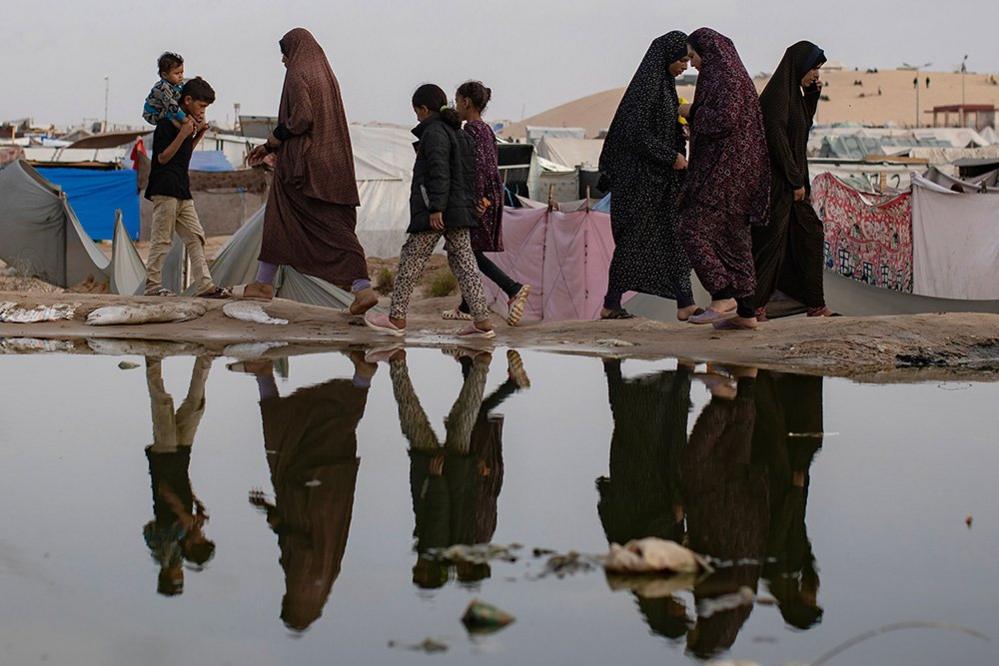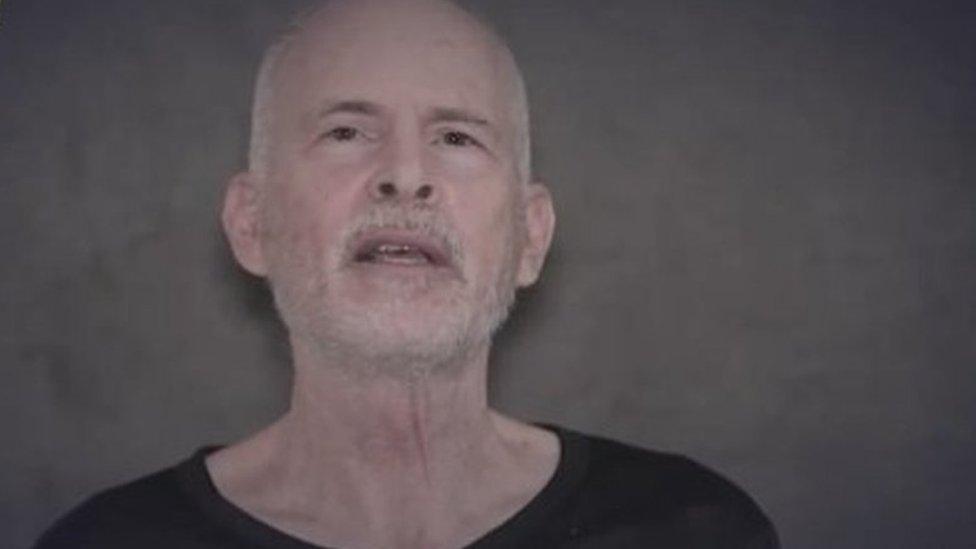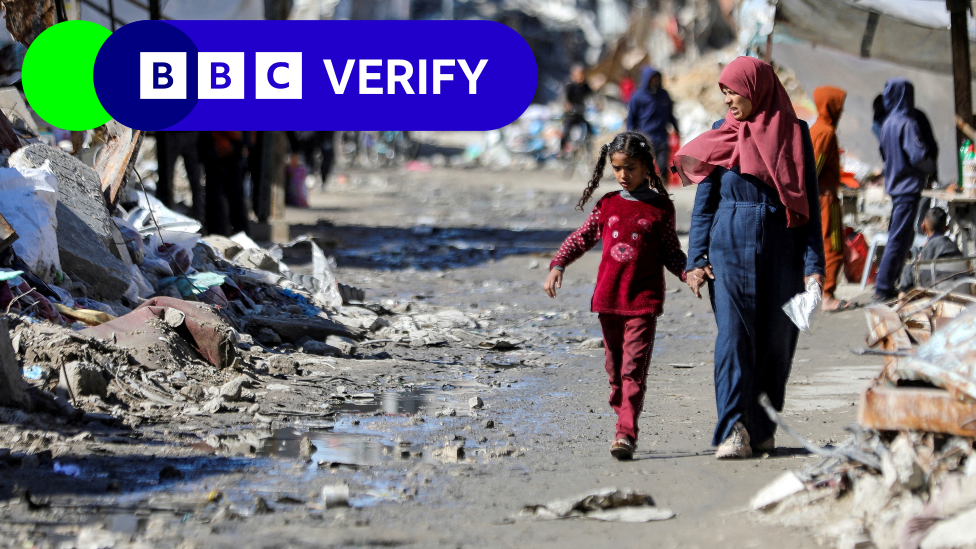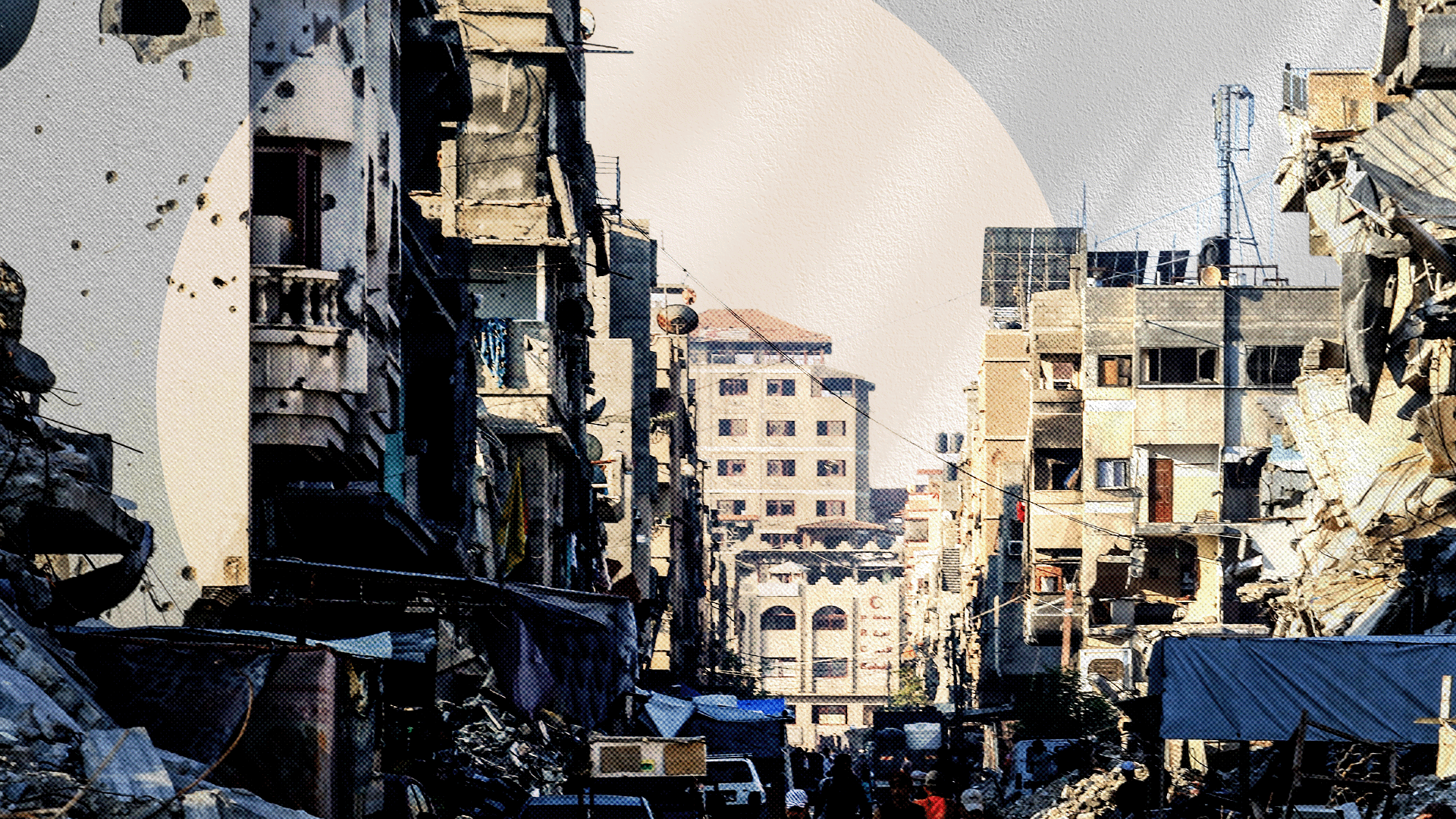Palestinian leader appeals to US to stop Israel's Rafah offensive
- Published

More than half of Gaza's population has been displaced to Rafah, with many forced to live in makeshift camps exposed to sewage spills and refuse
Palestinian President Mahmoud Abbas says the US is the only country that can stop Israel from attacking Rafah, the southern Gaza city where more than a million people are taking refuge.
Mr Abbas, who runs parts of the occupied West Bank, said any attack could see Palestinians flee Gaza.
Israel has consistently vowed to carry out an offensive in Rafah.
US President Joe Biden "reiterated his clear position" on Rafah to Israel PM Benjamin Netanyahu in a call on Sunday.
The US has repeatedly said it cannot support a large-scale Israeli military operation in Rafah without seeing a credible plan to keep civilians out of harm's way.
Speaking at the World Economic Forum (WEF) in the Saudi capital Riyadh earlier, Mr Abbas - whose Palestinian Authority is not present in Gaza, which has been under Hamas rule since 2007 - urged the US to intervene.
"We appeal to the United States of America to ask Israel to stop the Rafah operation because America is the only country capable of preventing Israel from committing this crime," he said, adding that only a "small strike" on Rafah would force the Palestinian population to flee the Gaza strip.
"The biggest catastrophe in the Palestinian people's history would then happen."
More than half of Gaza's population is in Rafah and conditions in the overcrowded southern city are already dire, with displaced people there telling the BBC there was a lack of food, water and medication.
While the White House did not elaborate on what specifically Mr Biden's latest comments to Mr Netanyahu were regarding the planning offensive in Rafah, national security spokesman John Kirby told the ABC network that Israel had agreed to listen to US concerns and thoughts before going in.
US Secretary of State Antony Blinken has arrived in Riyadh where he will hold talks with Mr Abbas at the start of a new Middle East tour.
Meanwhile, the indirect negotiations between Israel and Hamas over a potential ceasefire and the release of remaining hostages in Gaza, which have gained new momentum recently, have been further exposing divisions in Israel's governing coalition.
War cabinet member and opposition figure Benny Gantz on Sunday said that the current government "would not have the right to continue to exist" if a reasonable deal to return the hostages was not accepted.
"Entering Rafah is important in the long struggle against Hamas. The return of our abductees, is urgent and of far greater importance," Mr Gantz wrote on X, formerly Twitter.
The far-right Finance Minister Bezalel Smotrich, however, said the government should resign if it accepted a deal in which the planned offensive in Rafah was cancelled.
Their comments come after Israel's foreign minister said that the country could suspend the incursion, which Mr Netanyahu has said is the next step in its battle against Hamas, if there was a hostage deal.
The Israeli military said its chief Herzi Halevi had approved plans to continue the war, with Israeli media saying this referred to the Rafah operation.
Long-running talks mediated by Egypt and Qatar have largely stalled because of the gaps between the Israeli and Hamas positions, but on Sunday Hamas said it would send representatives to Cairo to give a response to the latest proposal.
US media have quoted unnamed Egyptian officials as saying the latest ceasefire proposal given to Hamas involved a several-week period of calm intended to lead to the end of the war, in return for the release of 20 hostages.
Hamas wants a permanent end to the war and withdrawal of all Israeli troops from Gaza, while Israel insists Hamas must be destroyed in Gaza and all hostages freed.
Egypt and other Arab states have previously said an influx of Palestinian refugees fleeing the war would be unacceptable because it would amount to the expulsion of Palestinians from their land.
Satellite pictures have shown new tent encampments being built near the Gaza coast, to the west of Rafah and the city of Khan Younis slightly further north, which has been left largely in ruins. Media reports say the tents are to accommodate people displaced from Rafah.

The current war began when Hamas attacked Israeli communities near Gaza, killing about 1,200 people, mainly civilians, and taking about 250 hostages. Some 133 hostages are believed still to be in Gaza, of whom about 30 are thought to be dead, after a brief truce in November saw some hostages released.
This week Hamas's armed wing released two videos showing the first proof of life of three hostages since they were abducted last October.
Israel's campaign of aerial bombardment and ground operations in Gaza since 7 October has killed 34,454 people, mostly civilians, according to the Hamas-run health ministry there.
Over the six months of war, the Israel Defense Forces (IDF) have entered and taken control of all of northern Gaza including Gaza City and most of central and southern Gaza including Khan Younis.
They have since withdrawn from almost all of those areas but troops remain stationed on a road Israel has built that separates northern and southern Gaza.
However, Palestinians displaced to southern Gaza - where the Israeli military told them to go for their own safety earlier in the war - have been unable to return to homes further north, a key demand Hamas is making in ceasefire talks, and Israel has given no indication when they will be allowed to.
Meanwhile, deadly Israeli bombardment has continued across Gaza, including in Rafah, with the Israeli military saying it has been striking launch sites for projectiles.
- Published28 April 2024

- Published6 April 2024

- Published16 January
